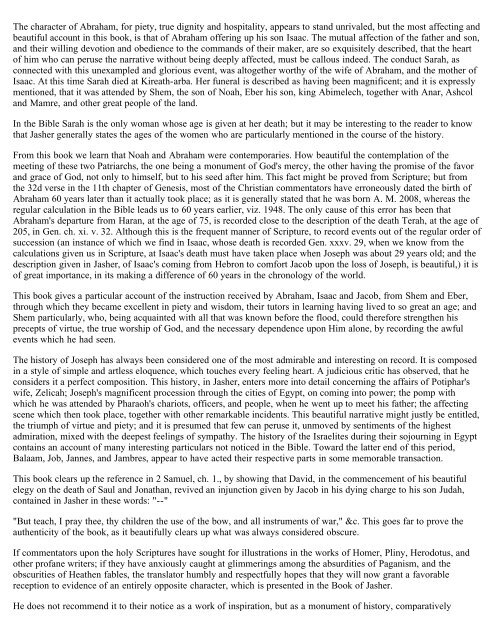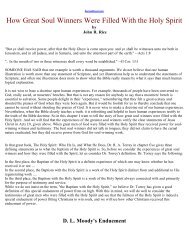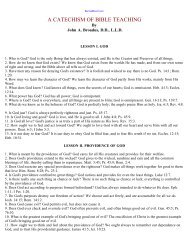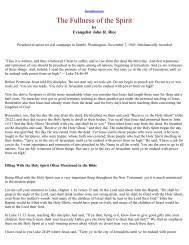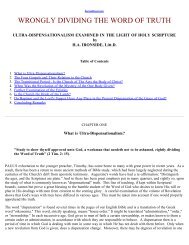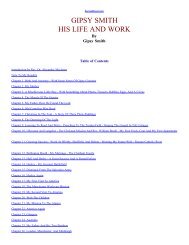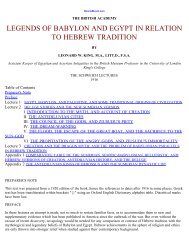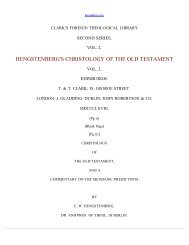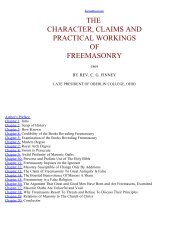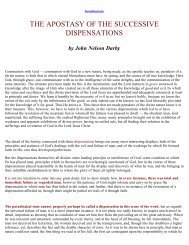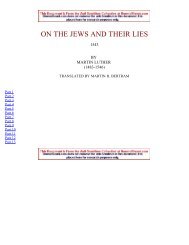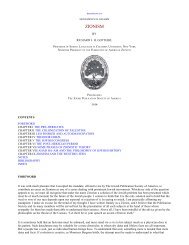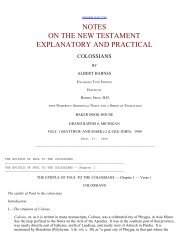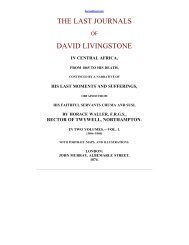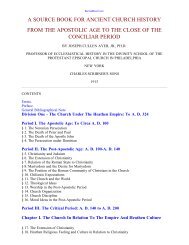The Book of Jasher.pdf - Bennie Blount.com
The Book of Jasher.pdf - Bennie Blount.com
The Book of Jasher.pdf - Bennie Blount.com
You also want an ePaper? Increase the reach of your titles
YUMPU automatically turns print PDFs into web optimized ePapers that Google loves.
<strong>The</strong> character <strong>of</strong> Abraham, for piety, true dignity and hospitality, appears to stand unrivaled, but the most affecting and<br />
beautiful account in this book, is that <strong>of</strong> Abraham <strong>of</strong>fering up his son Isaac. <strong>The</strong> mutual affection <strong>of</strong> the father and son,<br />
and their willing devotion and obedience to the <strong>com</strong>mands <strong>of</strong> their maker, are so exquisitely described, that the heart<br />
<strong>of</strong> him who can peruse the narrative without being deeply affected, must be callous indeed. <strong>The</strong> conduct Sarah, as<br />
connected with this unexampled and glorious event, was altogether worthy <strong>of</strong> the wife <strong>of</strong> Abraham, and the mother <strong>of</strong><br />
Isaac. At this time Sarah died at Kireath-arba. Her funeral is described as having been magnificent; and it is expressly<br />
mentioned, that it was attended by Shem, the son <strong>of</strong> Noah, Eber his son, king Abimelech, together with Anar, Ashcol<br />
and Mamre, and other great people <strong>of</strong> the land.<br />
In the Bible Sarah is the only woman whose age is given at her death; but it may be interesting to the reader to know<br />
that <strong>Jasher</strong> generally states the ages <strong>of</strong> the women who are particularly mentioned in the course <strong>of</strong> the history.<br />
From this book we learn that Noah and Abraham were contemporaries. How beautiful the contemplation <strong>of</strong> the<br />
meeting <strong>of</strong> these two Patriarchs, the one being a monument <strong>of</strong> God's mercy, the other having the promise <strong>of</strong> the favor<br />
and grace <strong>of</strong> God, not only to himself, but to his seed after him. This fact might be proved from Scripture; but from<br />
the 32d verse in the 11th chapter <strong>of</strong> Genesis, most <strong>of</strong> the Christian <strong>com</strong>mentators have erroneously dated the birth <strong>of</strong><br />
Abraham 60 years later than it actually took place; as it is generally stated that he was born A. M. 2008, whereas the<br />
regular calculation in the Bible leads us to 60 years earlier, viz. 1948. <strong>The</strong> only cause <strong>of</strong> this error has been that<br />
Abraham's departure from Haran, at the age <strong>of</strong> 75, is recorded close to the description <strong>of</strong> the death Terah, at the age <strong>of</strong><br />
205, in Gen. ch. xi. v. 32. Although this is the frequent manner <strong>of</strong> Scripture, to record events out <strong>of</strong> the regular order <strong>of</strong><br />
succession (an instance <strong>of</strong> which we find in Isaac, whose death is recorded Gen. xxxv. 29, when we know from the<br />
calculations given us in Scripture, at Isaac's death must have taken place when Joseph was about 29 years old; and the<br />
description given in <strong>Jasher</strong>, <strong>of</strong> Isaac's <strong>com</strong>ing from Hebron to <strong>com</strong>fort Jacob upon the loss <strong>of</strong> Joseph, is beautiful,) it is<br />
<strong>of</strong> great importance, in its making a difference <strong>of</strong> 60 years in the chronology <strong>of</strong> the world.<br />
This book gives a particular account <strong>of</strong> the instruction received by Abraham, Isaac and Jacob, from Shem and Eber,<br />
through which they became excellent in piety and wisdom, their tutors in learning having lived to so great an age; and<br />
Shem particularly, who, being acquainted with all that was known before the flood, could therefore strengthen his<br />
precepts <strong>of</strong> virtue, the true worship <strong>of</strong> God, and the necessary dependence upon Him alone, by recording the awful<br />
events which he had seen.<br />
<strong>The</strong> history <strong>of</strong> Joseph has always been considered one <strong>of</strong> the most admirable and interesting on record. It is <strong>com</strong>posed<br />
in a style <strong>of</strong> simple and artless eloquence, which touches every feeling heart. A judicious critic has observed, that he<br />
considers it a perfect <strong>com</strong>position. This history, in <strong>Jasher</strong>, enters more into detail concerning the affairs <strong>of</strong> Potiphar's<br />
wife, Zelicah; Joseph's magnificent procession through the cities <strong>of</strong> Egypt, on <strong>com</strong>ing into power; the pomp with<br />
which he was attended by Pharaoh's chariots, <strong>of</strong>ficers, and people, when he went up to meet his father; the affecting<br />
scene which then took place, together with other remarkable incidents. This beautiful narrative might justly be entitled,<br />
the triumph <strong>of</strong> virtue and piety; and it is presumed that few can peruse it, unmoved by sentiments <strong>of</strong> the highest<br />
admiration, mixed with the deepest feelings <strong>of</strong> sympathy. <strong>The</strong> history <strong>of</strong> the Israelites during their sojourning in Egypt<br />
contains an account <strong>of</strong> many interesting particulars not noticed in the Bible. Toward the latter end <strong>of</strong> this period,<br />
Balaam, Job, Jannes, and Jambres, appear to have acted their respective parts in some memorable transaction.<br />
This book clears up the reference in 2 Samuel, ch. 1., by showing that David, in the <strong>com</strong>mencement <strong>of</strong> his beautiful<br />
elegy on the death <strong>of</strong> Saul and Jonathan, revived an injunction given by Jacob in his dying charge to his son Judah,<br />
contained in <strong>Jasher</strong> in these words: "--"<br />
"But teach, I pray thee, thy children the use <strong>of</strong> the bow, and all instruments <strong>of</strong> war," &c. This goes far to prove the<br />
authenticity <strong>of</strong> the book, as it beautifully clears up what was always considered obscure.<br />
If <strong>com</strong>mentators upon the holy Scriptures have sought for illustrations in the works <strong>of</strong> Homer, Pliny, Herodotus, and<br />
other pr<strong>of</strong>ane writers; if they have anxiously caught at glimmerings among the absurdities <strong>of</strong> Paganism, and the<br />
obscurities <strong>of</strong> Heathen fables, the translator humbly and respectfully hopes that they will now grant a favorable<br />
reception to evidence <strong>of</strong> an entirely opposite character, which is presented in the <strong>Book</strong> <strong>of</strong> <strong>Jasher</strong>.<br />
He does not re<strong>com</strong>mend it to their notice as a work <strong>of</strong> inspiration, but as a monument <strong>of</strong> history, <strong>com</strong>paratively


